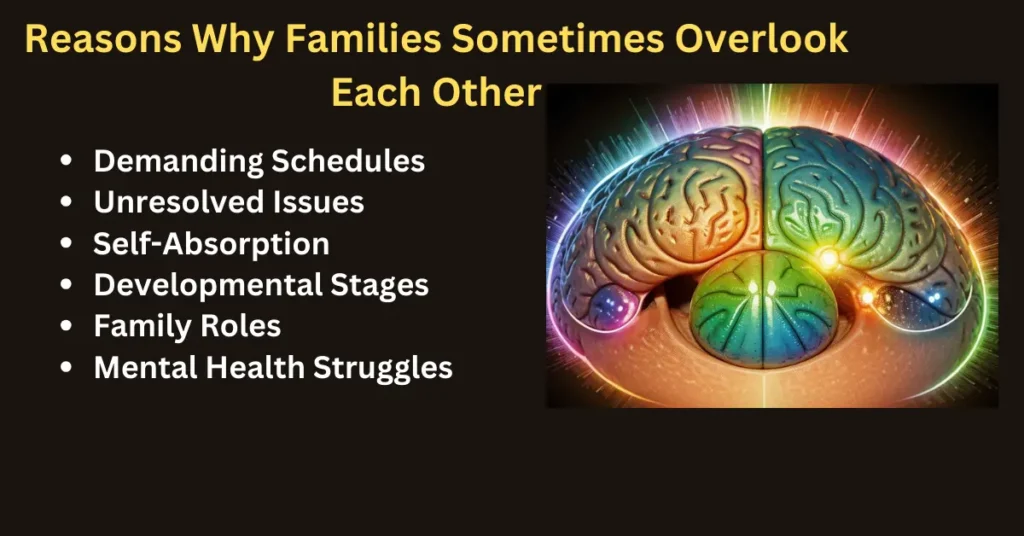
Do I Really Feel Invisible to My Family?
Have you ever had those moments where you’re around your family but feel like no one sees you? Like you could disappear into thin air and they wouldn’t notice? If so, you may be experiencing feelings of invisibility within your family dynamics. Feeling unseen by the people who are supposed to know and accept you best can be deeply painful.read full article-i feel invisible to my family
i feel invisible to my family:Signs You May Feel Unseen
- Lack of Interest in You: They don’t ask about your day, your interests, or what’s happening in your personal life. Conversations don’t flow naturally with back-and-forth sharing and listening.
- Exclusion from Decisions: Big lifestyle choices or plans are made without consulting you or valuing your perspective. Events are scheduled at times when you stated you have conflicts.
- Imbalanced Attention: Siblings or other family members tend to dominate discussions and receive more praise for accomplishments or efforts, whether real or perceived. The spotlight is rarely on you.
- Distant Relationships: Family bonding seems to happen more for others. One-on-one time with parents or catching up with extended relatives leaves you feeling more like an afterthought than priority.
- Assumptions Over Understanding: They don’t appear interested in genuinely getting to know your heart, dreams, struggles or who you are growing into as an individual anymore. Interactions feel superficial.
If several of these signs ring true, it may be a cue that you experiencing feelings of feeling invisible within your familial relationships currently. Of course, this is not necessarily anyone’s fault – there are usually understandable reasons behind these types of relationship dynamics.
Reasons Why Families Sometimes Overlook Each Other

There are a few common reasons why even close family members may struggle to make each feel truly seen at times:
Demanding Schedules – With work, school, activities and responsibilities consuming time, quality bonding takes a back seat. Attention spans are limited and conversations can be superficial.
Unresolved Issues – Past hurts, traumatic events, or personality clashes that were never properly discussed fester under the surface. Resentments build invisible walls between family members.
Self-Absorption – When life becomes a whirlwind, it’s easy to focus inward on our own problems rather than tune into loved ones. Busy family members talk at each other rather than with each other.
Developmental Stages – The natural process of independence challenges closeness. Teenagers pull away while parents learn to give space, sometimes over-correcting. Siblings compete for validation.
Family Roles – Be it children vying for approval, parents wrestling with guilt, or caregivers running on fumes, certain members inevitably take center stage while others fade to the background. Roles become rigid over time rather than fluid to meet changing needs.
Mental Health Struggles – Conditions like depression, anxiety or other issues may drain a family member’s cognitive and emotional bandwidth, making it difficult to recognize others’ experiences or meet their needs for attention.
While hurtful, try not to take others’ distractedness personally. more often than not it reflects realities of life rather than any deficiency within you. The key is loving communication to shore up bonds before cracks become too deep.
Tips for Feeling More Seen By Your Loved Ones
Once you recognize you may be experiencing feeling invisible at times, here are some proactive steps that can help boost your feelings of validation and closeness within family relationships:

- Initiate Deep Conversations – Ask them meaningful questions about their lives and actually listen to understand them better too. Share not just surface details about your day but also your heart.
- Schedule Quality Time – Whether one-on-one coffee chats with parents or sibling bonding nights, suggest focused time without distractions to reconnect meaningfully.
- Compromise on Scheduling – When major gatherings come up, communicate your availability kindly but clearly so your presence is factored into plans. Small changes go a long way.
- Share a Journal – Put your raw thoughts and feelings on paper to share strategically when the timing is right. Visual records can spark insightful talks by humanizing your inner world.
- Address Issues Gently – Broach stalled-out discussions or give positive yet honest feedback about ways you feel overlooked using “I feel” statements to avoid blame.
- Lead by Example – Make other family members a priority too by mirroring the engaged listening and interest you crave. Generosity often breeds more generosity in relationships.
- Give Patience and Grace – Unhealthy dynamics developed over years and won’t transform overnight. With compassion, keep the lines of caring communication open.
Small steps will show your proactive commitment while allowing others space to meet you halfway over time. Stay hopeful – changing family interaction patterns is well within reach when both hearts and minds are cooperative.
What To Do If Nothing Seems To Help
If after trying the above suggestions you continue to feel unseen and unimportant within your family relationships after time, it may be a sign that the dynamics have deeper issues requiring outside help. Here are some additional steps to consider:
| Steps | Description |
|---|---|
| Seek Community Elsewhere | Look for support and validation from friends, mentors, or community groups outside of the family circle. |
| Journaling & Counseling | Engage in journaling to process emotions and consider seeking therapy with a licensed therapist to develop healthy coping mechanisms and communication skills. |
| Family Counseling | Consider involving a counselor to facilitate discussions and provide impartial mediation, especially if family members are willing to participate in resolving issues. |
| Steps Back | Take necessary breaks from certain family members or situations to establish boundaries and prioritize self-care. Absence can allow for reflection and perspective, potentially leading to healthier interactions in the future. |
| Acceptance | Recognize that some relationships may not meet expectations and focus on nurturing fulfilling connections elsewhere. Accepting the limitations of certain relationships can alleviate the burden of unmet expectations. |
| Time & Perspective | Understand that life circumstances change over time, and relationships may evolve with maturity and new experiences. Revisit connections later to assess if perspectives have shifted and if there’s room for renewed understanding and growth. |
What are some other ways to seek validation from family members?
Some other ways to seek validation from family members include offering help without being asked, spending quality time listening to their stories, complimenting their accomplishments with sincerity, surprise acts of service like bringing their favorite snack or doing a small chore, thoughtful gestures through homemade cards and gifts showing you care, and expressing gratitude for the role they play in your life. Small acts of kindness go a long way in making others in your family feel seen and valued.
How do I know if my family is toxic?
Signs of a potentially toxic family include constant criticism, put-downs, and insults instead of encouragement. They may be overly competitive or controlling of decisions. Spending time together seems to make everyone stressed rather than joyful. Their words or actions violate your sense of trust, respect, or emotional/physical safety on a regular basis. They dishonor your personal boundaries without remorse. Toxic family members often resent change or signs of independence instead of celebrating your growth. If being around them drains your well-being, that is a red flag.
What are some ways to set boundaries with family members?

Some healthy ways to set boundaries include using “I feel” statements to express needs calmly, saying “no” respectfully when overwhelmed, taking breaks from interactions that cause distress, prioritizing your own health/ schedule occasionally, limiting private details shared until trust is rebuilt, removing yourself from escalating conflict, and clearly stating expectations for either singular events or long-term relationships. With understanding on both sides, boundaries protect both parties’ wellness.
What are some signs of a healthy family dynamic?
Signs of a healthy family dynamic include showing affection, apologizing when wrong, compromising respectfully, supporting each through challenges, quality time spent together stimulated by caring conversation, balance between time together versus independently, constructive conflict followed by resolution, shared responsibilities without resentment, and celebrating each member’s unique strengths, interests and pursuits as a team. Loyalty, trust and personal growth are encouraged within positive communication patterns focused on the future.
Conclusion – You Are Not Alone and There Is Hope
If you’ve read this far, hopefully you now feel more seen and understood in your experience of feeling invisible within family relationships at times. Remember that many can relate to experiencing distance, hurt, or longing for deeper connection from loved ones. While wounds sting, try replacing condemnation with compassion – for yourself and others.
Family bonds are precious yet complex. With effort and community caring for each, relationships have potential for growth. But first make your well-being a priority by finding healthy outlets, processing emotions, and avoiding resentments. Approach connections with patience, honesty and grace; lead with love while setting boundaries for your emotional health too.
Wherever you’re at – whether hopeful for change or coming to terms with distance – this challenging journey will define and strengthen you. You have so much wonderful life ahead filled with people who appreciate you for exactly who you are. While family plays a role, your worth isn’t measured by others’ recognition alone. Focus on cultivating fulfilling relationships and pursuing passions that fill your cup independently of circumstances outside your control.
You’ve got this. Have faith that today’s difficulties often pave the road toward tomorrow’s wisdom and resilience. And remember, you are not alone. Many kind souls walking similar paths would gladly lift you up. Brighter days are coming – keep marching forward with your head held high.
how to communicate feeling lonely in a relationship